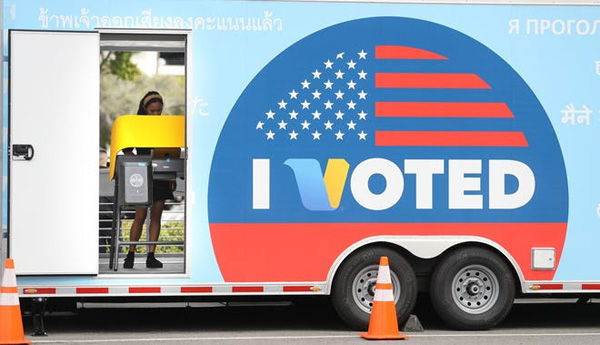
Candidates had only two days to campaign between the South Carolina primary and Super Tuesday, March 3, when 14 states conduct primaries. Yet, folks in many of those states started voting weeks ago.
Minnesotans began casting votes on Jan. 17. You know who was still in the race on Jan. 17? Former Massachusetts Gov. Deval Patrick; businessman Andrew Yang; former Maryland Rep. John Delaney; Colorado Sen. Michael Bennet; businessman Tom Steyer; former South Bend, Ind. Mayor Pete Buttigieg, and Minnesota Sen. Amy Klobuchar. They're all gone, but back in mid-January early voters didn't know that.
Vermont, another Super Tuesday state, began accepting ballots Jan. 18, one day after Minnesota. Californians have been filling out Super Tuesday ballots since Feb. 3, with over a million votes cast before Bloomberg made his first appearance on a debate stage and showed how inarticulate he really is, before former Vice President Joe Biden finally won a primary, before Vermont Sen. Bernie Sanders said kind words about Cuban dictator Fidel Castro on "60 Minutes," and before Massachusetts Sen. Elizabeth Warren showed some muscle.
Does that timing make any sense? Democrats — those running and those voting — are stressed enough without competing with the calendar.
Consider the fate of Buttigieg's early voters. In California roughly 3 million people had voted before he dropped out, and based on Real Clear Politics polling averages that means about 240,000 Californians gave him meaningless votes. In Texas, the second largest Super Tuesday state, Buttigieg received an estimated 55,000 early votes. Klobuchar, who dropped out hours after Buttigieg, probably got about 150,000 early votes in California and 50,000 in Texas; businessman Tom Steyer, who quit the race late Saturday, received 105,000 worthless votes from the two states.
If the rationale for dropping before Super Tuesday was to allow supporters to move to more viable candidates, then early voting has ruined it for nearly 600,000 Democrats in just these two states.
Early voting, in its various forms, is part of an understandable effort to get more Americans to participate. Yet, there is a gap — practically and politically — between getting out the vote and getting out the facts.
Some early voting is certainly necessary to accommodate those stationed out of state, such as members of the military. In 2009 Congress enacted a law requiring absentee ballots for military voters to be available for mailing 45 days prior to an election. Some states, such as Vermont, decided to simply extend that privilege to all residents.
However, federal law also requires a uniform day of voting. In 2001 Oregon's early voting was challenged but a federal court ruled that elections must only be "consummated" on Election Day. As long as votes aren't counted until then, it doesn't matter how early they are cast.
In the 2016 presidential primary, nearly 60% of California's ballots were cast before Election Day. That figure is likely to climb this year because the state has increased the number of ballots sent weeks in advance to registered voters — whether they wish to vote early or not.
After Buttigieg dropped out Sunday night, there were pleas from some of his supporters, according to the Los Angeles Times, for a "revote." Of course, there is no such thing; Californians who already voted for Buttigieg are out of luck. The only thing these people achieved with their wasted ballots is to remind us how rapidly things change. Votes, like a polls, capture a moment in time, and the snapshots taken 30 or 45 days ago look pretty fuzzy today.
A few weeks ago, as Nevadans were casting early votes ahead of the caucus, I spoke to mystified Democrats who were unable to grasp the early-voting format. On the "early" ballot, voters were asked for their top five presidential choices. Nearly three-quarters of all votes in the state were cast early — before the debate in Las Vegas that was designed to help Nevadans make an informed choice.
After this year's messy nominating experience much will change. Caucuses are likely to disappear and the rules by which candidates qualify for debates will be revised. Early voting should be re-examined as well. A one-week voting period might make sense, but opening the polls for a month or longer only enhances the likelihood of voter regret.
In the hours before Super Tuesday, the remaining Democratic contenders will scurry after the biggest prizes — California's 415 delegates and Texas' 228 — only to be confronted by the fact that Californians have been voting since Feb. 3 and Texans since Feb. 18. As the philosopher Yogi Berra once observed, "It gets late early out there."
(c) Peter Funt. This column originally appeared in USA Today.
|



